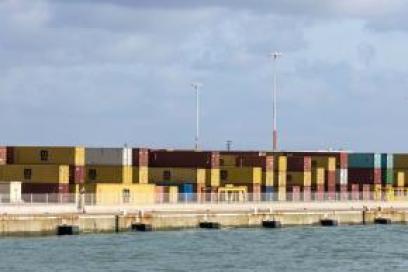- ABOUT US
- GOODS
- A multi-sector focus
- A maritime service offering in the first rank
- An attractive multimodal offering
- An expanded shortsea service offering
- Terminaux portuaires et quais à usage partagé
- High-quality ship services
- Fluid, facilitated goods throughput
- A port that puts its performance figures in the public domain
- PASSENGERS
- MULTIMODALITY
- ECOLOGICAL TRANSITION
- INNOVATION
HAROPA PORT strengthens its position as a major gateway for freight transport on the North European range
TiL, which is now the sole shareholder of the TPO / TNMSC container terminals at Le Havre, has today announced a major investment programme that will strengthen the port’s role as a north west Europe gateway.
A major investment
The €700 million investment will lead to the creation of 900 jobs for dockers and 200 for maintenance workers over the next six years. It will also make the terminal ready for the highly efficient processing of the world’s biggest cargo ships, including the new generation of 24,000 TEU vessels.
The ambitious modernisation plans are the result of a historic agreement between the Dockers Workers' Union of the Port of Le Havre CGT, TiL and the TPO/TNMSC terminals. TiL is MSC’s terminal business; its shareholder partners are the US Global Infrastructure Partners (GIP) and GIC, a Singapore Government Sovereign Wealth Fund.
New infrastructure to boost volumes
TiL is installing park gantries, doubling the number of gantries at the terminal to 20. The order for the first nine is imminent. TiL will also triple the terminal’s storage capacity with the installation of fleet gantries at six berths. The conversion project will be completed by 2028.
The new park gantries will be electric powered and the port will provide shore power for ships. This project, led by HAROPA PORT, will mean ships will not need to use their engines while docked.
Importantly, investment will also go into integration with barge and rail transport. This will remove the bottlenecks of road transport, opening up the potential for significant increases in volume while reducing the overall environmental impact of each journey.
